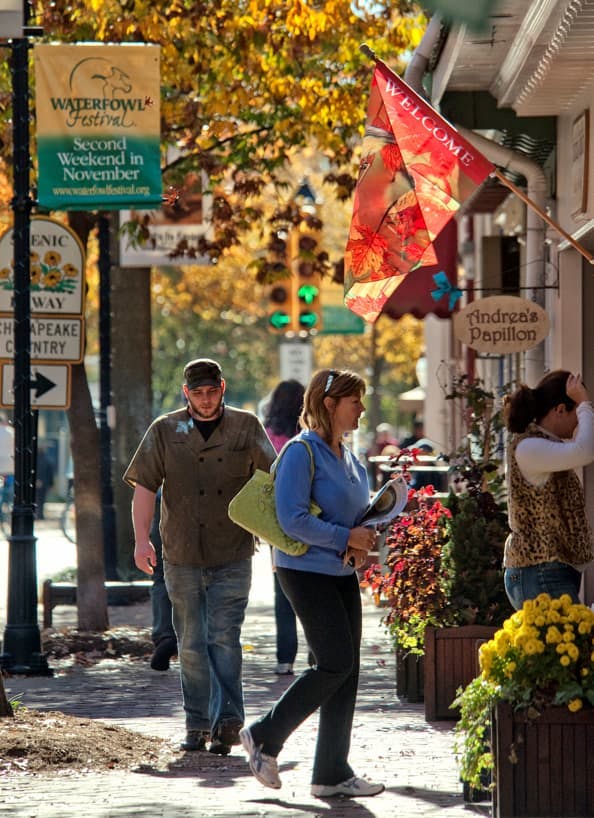Comprehensive Economic Development Strategy
Supporting a Prosperous Mid-Shore
Supporting a Prosperous Mid-Shore



Goals & Objectives
The goals outlined in this CEDS were developed in response to the barriers to economic development, and the needs and opportunities identified in the analysis.
These goals provide a comprehensive framework for guiding future economic development decisions within the Mid-Shore Region. They also reflect the direction and types of economic activity to be encouraged.
- Infrastructure
- Marketing
- Innovation
- Industries
- Workforce
- Technology
- Quality of Life
- Design and implement a master plan for regional telecommunications infrastructure and facilities to provide affordable, accessible, redundant broadband services for the public and private sectors.
- Conduct regional water and wastewater assessments and determine capacity and technology needs to handle future growth and economic development.
- Improve the services available at existing and new industrial and commercial sites to further their potential for development.
- Establish and support regional investor network(s) and increase awareness, involvement and investments from angel investors and venture capital firms.
- Support and expand regional revolving loan and grant funds to promote job growth and local resources and support expansion of local businesses.
- Strengthen transportation linkages and make recommended improvements to regional highways and transportation.
- Support the funding and expansion of the coordinated regional transit program.
- Bring together federal, state, and local funding to acquire land and infrastructure for the development of business parks and technology training centers.
- Focus on promoting the growth and competitiveness of the local manufacturing sector by supporting infrastructure improvements, innovation, workforce development, and attracting new manufacturing businesses to the region; aiming to create jobs, stimulate economic diversification, and enhance the region's overall economic resilience by leveraging existing manufacturing strengths and/or identifying new opportunities within the industry.
- Support the creation of a regional branding plan that supports the CEDS vision statement and obtain support from each county and local business leaders.
- Position our region so that it warrants public and private investment in economic growth.
- Support ongoing regional efforts to grow the cultural, heritage, natural, agricultural, and eco-tourism industries.
- Establish incubation programs that accelerate the development of science and technology-based businesses, including marine, agriculture, aquaculture, forestry, and environmental.
- Develop and support centers for entrepreneurship and innovation.
- Develop technical assistance programs and encourage the attraction of resources that help advance greater awareness, identification, protection, and utilization of innovation and technology, including an increase in the number of patents, for the purpose of commercializing new products and services and accelerating business growth.
- Develop CEO and peer groups to provide technical support for new, expanding, or struggling businesses.
- Support the development of renewable, sustainable fuel sources.
- Recognizing that cyber hygiene is the first step toward cybersecurity, encourage and support businesses and organizations to adopt best practices when utilizing computers, online platforms, and social media to conduct their operations.
- Support the development of renewable, sustainable fuel sources.
- Explore and identify emerging agricultural and food market opportunities associated with soy, common grains and other agricultural products that can be grown locally and provide high-value markets for Delmarva producers and natural resource-based industries.
- Support the development of value-added agriculture businesses.
- Identify opportunities for high-value aquaculture operations (to include finfish and shellfish) that create new opportunities for watermen and entrepreneurs.
- Work with legislators to remove local and state policies that are a barrier to on-farm processing and innovative niche farming operations.
- Retain the region’s largest agriculture sector – poultry.
- Support initiatives to protect the environment using resource-based technology that garners a probable return on investment.
- Sustain existing forest product businesses; support the development of growth opportunities for the forest products sector and remove barriers.
- Ensure that continuous learning and workforce development resources are available to all segments of our population.
- Monitor the growth of the region’s communities to periodically ascertain the impact on long-term infrastructure needs.
- Support and sustain a comprehensive resource that provides useful, unbiased information regarding the demographic and geographic characteristics of the region.
- Assess current strengths and deficits of QoL in the Mid-Shore including: access to thriving commercial and downtown districts, restaurants, entertainment venues, and gathering/open spaces; variety and quality of transportation choices including walking, biking, driving, and public transit; availability of artistic and cultural experiences; array of leisure/recreation options; availability of quality and affordable housing; home ownership opportunities; access to quality medical care; quality of preK-12 education, childcare, and caregiving support; and opportunities of higher and continuing education.
- Develop strategies to sustain and amplify QoL strengths.
- Prioritize QoL deficits to be addressed and develop a remediation plan that highlights short-term fixes and longer-term initiatives.

Vision Statement
By executing a strategically sound business development and retention strategy, encompassing every Mid-shore jurisdiction, create a community where individual growth is nurtured and encouraged, where the creation of wealth is the result of a viable and diverse business community, where a range of cultural programs provide relaxation and stimulation, and where educational institutions provide opportunities for every age and socio-economic profile to improve their standard of living and reside in a safe and clean environment.
- Continually seek to improve education and training opportunities
- Preserve and promote the culture and heritage of the region
- Nurturing new ideas in the arts and business
- Foster the growth of broad spectrum of knowledge based industries
- Create more opportunities to retain our youth by providing suitable employment and living conditions
- Continue to focus growth in the towns and villages that have adequate workforce, transportation, and infrastructure
- Support existing and new efforts to strengthen and diversify our resource-based industries

Action Plan
The following projects have been identified and ranked for the program year. They represent a comprehensive approach to achieving our regional economic development goals and mitigating existing challenges to high wage job creation in the region.
Although EDA funding is a primary source for many of the projects the CEDS Committee and Counties understand that financial assistance will be sought from various state and federal agencies.
To help the applicants gauge whether their projects are eligible for EDA funding and meet current funding priorities, the Committee requested the development of an evaluation matrix. Founding Steering Committee member, John General, created the CEDS Project Evaluation Guidelines (PEG).
Background
For the past 300 years much of the Mid-Shore Region has relied on commercial agriculture as a primary industry. To diversify the industry base of Caroline County several industrial parks were established in the 1970’s. These parks have been filled and primarily house light manufacturing and distribution companies.
Caroline County qualifies as a One Maryland jurisdiction based on low per capita income and is a priority State investment area. Lack of improved land and business parks has been identified as a barrier to economic development in the Region by the CEDS committee. To this end, Caroline County is undertaking two major initiatives: 1) The development of Ridgely Regional Airport and, 2) The construction of the Mid-Shore Business and Technology Park which will be located adjacent to the airport.
Purpose
The Business and Technology Park will develop a modern facility that is strategically located to promote economic growth and create higher paying jobs. The strategy of the project is to build the capacity for technology related businesses and compliment other similar efforts in the region. The Ridgely site offers businesses the opportunity to utilize the adjacent airport facilities to enhance their logistics and marketability. By locating the park next to the airport, we expect to grow an aviation industry cluster that will diversify the Caroline County and regional economy.
Project Description
The location of the technology park is one mile north of Ridgely, Maryland just off MD Route #312. The Town of Ridgely is in the process of annexing the area into the town. Ridgely has also agreed to provide sewer and water to the Technology/Business Park and the airport.
Phase One of the project is to acquire the property known as the “Hayman Farm” which consists of several parcels totaling approximately 92 acres. An option to purchase the property has been negotiated with a purchase price of $750,000 that will be paid by Maryland One funding. The area has been rezoned by the County and has received from the Department of Planning Priority Funding Area (PFA) status as of June 25, 2002. The Phase One and Phase Two environmental studies have been completed. Additionally, all necessary studies have been accomplished in this phase including the engineering master plan and the business plan.
The second phase of the project is the development of the park that includes building site preparation, the infrastructure and the construction of the first park building. Groundbreaking ceremony occurred on November 28, 2006. Completion date for site construction is 270 days.
Cost
Total Project Cost: $6,900,000
Estimated Maryland One financing: $4,500,000
Funding request from EDA: $2,100,000 (Water, sewer, and roads)
Caroline County: $300,000
This exciting project represents a new direction in economic development for Caroline County. The Caroline Business and Technology Park is a top priority of both the Commissioners of Caroline County and the Town of Ridgely officials. We have also been encouraged by the help provided by the Maryland Department of Commerce. Caroline County has proceeded with this project and has demonstrated the ability and commitment to support this endeavor.
Project Partners
- Caroline County
- Town of Ridgely
- Maryland Department of Commerce
- Mid-Shore Regional Council
- EDA
- USDA
- Rural Development Center, UMES